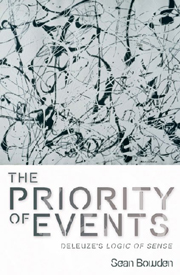Book contents
- Frontmatter
- Contents
- Acknowledgments
- Abbreviations
- Introduction: The Ontological Priority of Events in The Logic of Sense
- 1 The Stoics – Events and Sense
- 2 Leibniz – The Static Ontological and Logical Geneses
- 3 Lautman and Simondon – Problematic Ideas and Singularities
- 4 Structuralism – Structure and the Sense-Event
- 5 Psychoanalysis – Dynamic Genesis
- Conclusion
- Bibliography
- Index
4 - Structuralism – Structure and the Sense-Event
Published online by Cambridge University Press: 12 September 2012
- Frontmatter
- Contents
- Acknowledgments
- Abbreviations
- Introduction: The Ontological Priority of Events in The Logic of Sense
- 1 The Stoics – Events and Sense
- 2 Leibniz – The Static Ontological and Logical Geneses
- 3 Lautman and Simondon – Problematic Ideas and Singularities
- 4 Structuralism – Structure and the Sense-Event
- 5 Psychoanalysis – Dynamic Genesis
- Conclusion
- Bibliography
- Index
Summary
As noted in the previous chapter, Deleuze's work on the relation between language and the problem is primarily couched in a structuralist vocabulary, and no longer explicitly in terms of ‘problems’ and ‘solutions’. However, as we shall see, Deleuze's concept of structure is, to all intents and purposes, identical to that of the problem. Indeed, in Difference and Repetition – the text which formed the basis of our examination of the concept of the problem in The Logic of Sense, and published only one year before this latter – Deleuze explicitly aligns the problematic Idea and structure. He writes, for example, that the ‘Idea is thus defined as a structure. A structure or an Idea is a “complex theme”, an internal multiplicity – in other words, a system of multiple, non-localizable connections between differential elements which is incarnated in real relations and actual terms’ (DR, 183; see also DR, 191. On the rapprochement of the ‘linguistic Idea’ and structuralism in linguistics, see DR, 203–5). It will thus be the task of this chapter to elucidate Deleuze's concept of ‘structure’ in The Logic of Sense, its identity with the concept of the problem, and how it guides Deleuze's thinking about language.
In this chapter, we shall also examine how some of the issues previously examined in relation to the Stoics and Leibniz can be re-described in structuralist terms. In particular, with respect to the Stoics, we shall observe how the ‘dualities’ inherent in the Stoic system (cause/effect, body/language, thing/incorporeal sense), along with the ‘infinite regress of sense’, can be dealt with in a structuralist and hence ‘problematic’ vocabulary.
- Type
- Chapter
- Information
- The Priority of EventsDeleuze's Logic of Sense, pp. 152 - 184Publisher: Edinburgh University PressPrint publication year: 2011



